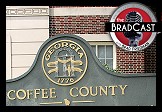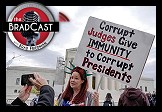
"How am I to get in?" asked Alice again, in a louder tone.
"Are you to get in at all?" said the Footman. "That's the first question, you know."
It was a Queen of Hearts sort of a day in California on August 9, 2006. The Secretary of State's advisory panel was hearing public comments regarding the pending certification of the Vote-PAD, a non-electronic assistive device designed to help voters with disabilities mark and verify a paper ballot independently.
Voting integrity advocates held signs supporting the certification of Vote-PAD. They told of countless failures of computerized voting systems. They spoke about recent discoveries of easily hackable "back doors" into the vote totals on those systems, which have been certified. By contrast, "Vote-PAD is no more hackable than a #2 pencil," said one.
Notwithstanding this and the letters praising the Vote-PAD from dozens of people with visual and motor disabilities, the Secretary of State's staff was recommending against certifying the Vote-PAD for use in California.
The Queen started by describing the testing process, "We asked them to vote independently on the Vote-PAD, and we told them exactly what to do the entire time."
"Excuse me," said Alice, "but how is that independent?"
"That's not the point," said the Queen. "The point is that they weren't able to vote independently."
"But you didn't let them," objected Alice.
"Yes!" murmured the jury.
"Let's be clear on one thing," spoke the Queen. "When disabled people tried to vote on the Vote-PAD, their error rate was unacceptably high and they took an excessively long time."
"Compared to what?" asked one of the jurors.
"Nothing," said the Queen. "Nothing at all. We have no standards."
"--I believe I can guess that," she added, aloud.
"What was the error rate on the voting systems you've approved, and how long did people take to vote on them?" asked Alice.
"We haven't used people with disabilities to test the other systems," said the Queen. "We know nothing about that."
"Nothing whatever?" asked a voting integrity advocate.
"Nothing whatever," said the Queen.
"So, how do you know they did worse with the Vote-PAD?"
"Because!" said the Queen.
"Of course!" said the jury. "That makes sense!"
The Queen continued, "Everyone had to vote four write-in candidates. They made over half their mistakes on the write-in votes."
"Wait!" objected a juror, "Write-ins are a universal problem. They're a problem on every voting system."
A county registrar spoke up, "And why so MANY write-ins? That's such a small part of a real election, and it was such a big a part of the testing."
"And voters wouldn't hop-scotch around the ballot the way you told them to, said another registrar. "It's unnatural, confusing."
"Hush, hush!" ordered the Queen. "We were stress testing the system."
"But," cried Alice, "That wasn't stress testing the system. It was stress testing the people with disabilities!"
"Regardless," the Queen dismissed the comment with a wave of her hand and went on, "Blind people can't verify write-in candidate names reliably on the Vote-PAD."
"They can't verify write-in names at all on the Hart InterCivic eSlate," Alice objected, "and you certified the eSlate."
"Off with their heads!" cried the Queen.
After a lull, Alice pointed out, "Blind people can verify their ballots with Vote-PAD."
"But they can't verify other people's ballots," countered the Queen. "They have to be able to verify other people's ballots."
In response to joint applications submitted by Vote-PAD, Inc. and California counties, Secretary of State Bruce McPherson's voting system staff set up two days of certification testing of the Vote-PAD in July.
With no training or experience in usability testing, the Secretary's staff and computer voting system consultants conducted "usability" testing on the Vote-PAD.
This event marks the first time the Secretary has ever used people with disabilities to test a voting device intended for use by people with disabilities, despite the fact that it has certified numerous such systems.
During the test, participants were not allowed to vote independently on the Vote-PAD, but were instead subjected to an artificial voting environment where they were frequently interrupted by staff during the voting process. From this critically flawed testing, the Secretary concluded that they would not be able to vote independently.
"We appreciate the participation of the people with disabilities, and we believe they performed quite successfully, given the unrealistic, trying conditions to which they were subjected," said Ellen Theisen, President of Vote-PAD, Inc. "Especially considering that in a recent Rice University usability test conducted on able-bodied, experienced voters, 16% of the ballots contained errors," she added.
Two human factors experts, Dr. Valerie Rice and Noel Runyan, submitted written testimony stating that the testing process put together by Secretary of State's staff violated basic principles of usability testing. These experts pointed out that any results would be unreliable. The Secretary ignored the testimony of these experts and agreed with his non-expert staff's negative assessment of the results.
Friday, August 25, 2006, Secretary McPherson signed a letter denying certification to Vote-PAD, thus denying California voters a paper-based, accessible alternative to computers.
The Registrars in six California counties wanted to provide the Vote-PAD to assist their voters with disabilities. Instead, they will be forced to use computerized voting machines, which have never been tested for accessibility by Secretary McPherson, and which have been the subject of great concern regarding their security and reliability. Now, these registrars are at risk of being embroiled in the lawsuits recently filed in California by disabilities organizations and voting integrity advocates opposing the use of the computerized voting machines.
"Off with their heads," boomed the Queen.
"Off with their heads," agreed the jury.
"Off with their heads," echoed the Secretary of State.
Theisen remarked, "Secretary McPherson simply rubberstamped the staff's contorted testing and evaluation."
Contact: Ellen Theisen
President of Vote-PAD, Inc.
360-437-9922
ellen@vote-pad.us


 Sunday 'Stormy Weather Continues' Toons
Sunday 'Stormy Weather Continues' Toons Facing Down the Threat to American Democracy: 'BradCast' 5/9/24
Facing Down the Threat to American Democracy: 'BradCast' 5/9/24 'Green News Report' 5/7/24
'Green News Report' 5/7/24
 Trump Trial Ketchup:
Trump Trial Ketchup: New Cybersecurity Breach in Coffee County, GA: 'BradCast' 5/7/24
New Cybersecurity Breach in Coffee County, GA: 'BradCast' 5/7/24 'Green News Report' 5/7/24
'Green News Report' 5/7/24 2024 Electoral -- and Climate -- Omens: 'BradCast' 5/6/24
2024 Electoral -- and Climate -- Omens: 'BradCast' 5/6/24 Sunday 'Self Reflecting' Toons
Sunday 'Self Reflecting' Toons 'Green News Report' 5/2/24
'Green News Report' 5/2/24 Pro-Palestine Protests, Proportionality, and Political Perspective: 'BradCast' 5/2/24
Pro-Palestine Protests, Proportionality, and Political Perspective: 'BradCast' 5/2/24  Trump Trial Ketchup: Criminal Contempt and His Two-Tier Justice: 'BradCast' 5/1/24
Trump Trial Ketchup: Criminal Contempt and His Two-Tier Justice: 'BradCast' 5/1/24 CANNING: Third-Party Myopia v.
CANNING: Third-Party Myopia v. A Few Hits of Dopamine for Your Listening Pleasure: 'BradCast' 4/30/24
A Few Hits of Dopamine for Your Listening Pleasure: 'BradCast' 4/30/24 SCOTUS Corruption on Full Display at Trump 'Immunity' Hearing: 'BradCast' 4/29/24
SCOTUS Corruption on Full Display at Trump 'Immunity' Hearing: 'BradCast' 4/29/24 Trump's Ridiculous 'Immunity' Case Heard by Corrupted SCOTUS: 'BradCast' 4/25/24
Trump's Ridiculous 'Immunity' Case Heard by Corrupted SCOTUS: 'BradCast' 4/25/24 NY Trump Trial Mid-Week Ketchup: 'BradCast' 4/24/24
NY Trump Trial Mid-Week Ketchup: 'BradCast' 4/24/24 'Election Fraud, Pure and Simple': 'BradCast' 4/23/24
'Election Fraud, Pure and Simple': 'BradCast' 4/23/24
 VA GOP VOTER REG FRAUDSTER OFF HOOK
VA GOP VOTER REG FRAUDSTER OFF HOOK Criminal GOP Voter Registration Fraud Probe Expanding in VA
Criminal GOP Voter Registration Fraud Probe Expanding in VA DOJ PROBE SOUGHT AFTER VA ARREST
DOJ PROBE SOUGHT AFTER VA ARREST Arrest in VA: GOP Voter Reg Scandal Widens
Arrest in VA: GOP Voter Reg Scandal Widens ALL TOGETHER: ROVE, SPROUL, KOCHS, RNC
ALL TOGETHER: ROVE, SPROUL, KOCHS, RNC LATimes: RNC's 'Fired' Sproul Working for Repubs in 'as Many as 30 States'
LATimes: RNC's 'Fired' Sproul Working for Repubs in 'as Many as 30 States' 'Fired' Sproul Group 'Cloned', Still Working for Republicans in At Least 10 States
'Fired' Sproul Group 'Cloned', Still Working for Republicans in At Least 10 States FINALLY: FOX ON GOP REG FRAUD SCANDAL
FINALLY: FOX ON GOP REG FRAUD SCANDAL COLORADO FOLLOWS FLORIDA WITH GOP CRIMINAL INVESTIGATION
COLORADO FOLLOWS FLORIDA WITH GOP CRIMINAL INVESTIGATION CRIMINAL PROBE LAUNCHED INTO GOP VOTER REGISTRATION FRAUD SCANDAL IN FL
CRIMINAL PROBE LAUNCHED INTO GOP VOTER REGISTRATION FRAUD SCANDAL IN FL Brad Breaks PA Photo ID & GOP Registration Fraud Scandal News on Hartmann TV
Brad Breaks PA Photo ID & GOP Registration Fraud Scandal News on Hartmann TV  CAUGHT ON TAPE: COORDINATED NATIONWIDE GOP VOTER REG SCAM
CAUGHT ON TAPE: COORDINATED NATIONWIDE GOP VOTER REG SCAM CRIMINAL ELECTION FRAUD COMPLAINT FILED AGAINST GOP 'FRAUD' FIRM
CRIMINAL ELECTION FRAUD COMPLAINT FILED AGAINST GOP 'FRAUD' FIRM RICK SCOTT GETS ROLLED IN GOP REGISTRATION FRAUD SCANDAL
RICK SCOTT GETS ROLLED IN GOP REGISTRATION FRAUD SCANDAL VIDEO: Brad Breaks GOP Reg Fraud Scandal on Hartmann TV
VIDEO: Brad Breaks GOP Reg Fraud Scandal on Hartmann TV RNC FIRES NATIONAL VOTER REGISTRATION FIRM FOR FRAUD
RNC FIRES NATIONAL VOTER REGISTRATION FIRM FOR FRAUD EXCLUSIVE: Intvw w/ FL Official Who First Discovered GOP Reg Fraud
EXCLUSIVE: Intvw w/ FL Official Who First Discovered GOP Reg Fraud GOP REGISTRATION FRAUD FOUND IN FL
GOP REGISTRATION FRAUD FOUND IN FL


































